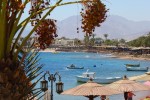A view of shore from a dive shop in Dahab, South Sinai, Egypt. (photo by B. Simpson via commons.wikimedia.org)
During the upcoming school holidays of Passover, followed by the summer months, many Israelis travel abroad. Europe is only a few hours away by plane, and the beaches of Cyprus and Greece are even closer. Vacations abroad, even including the flight, are often cheaper than local getaways because of the high price of Israeli hotels. However, the Israeli government has issued travel warnings for 41 countries, including Europe and Asia.
“Recent terrorist attacks by Islamic extremists in Belgium, Canada, Australia, France and Denmark raise concerns over additional attacks against Western targets, including Israeli and Jewish targets, by veterans of the fighting in Syria and Iraq who are affiliated with global jihad (including Islamic State) and by local elements inspired by the terrorist organizations.”
The travel warning, issued by the National Security Council Counter-Terrorism Bureau, noted that is illegal for Israelis to travel to “Syria, Iraq (including Iraqi Kurdistan), Iran, Lebanon, Yemen and Saudi Arabia.”
The warning comes amid a spate of attacks on Western and Jewish targets including the Charlie Hebdo magazine and the Jewish supermarket in Paris, the shooting in Denmark and, just this weekend, an attack on a synagogue in London.
Israeli terrorism experts say Israelis do not seem to be the primary target of these attacks.
“Until now there have been two main targets – governmental targets in Western countries and Jewish institutions,” Reuven Ehrlich, a terrorism expert, explained. “Israelis have not been the target, but I cannot tell you what it will be in the future.”
However, the warnings do not seem to be affecting travel plans. Israelis have one of the highest rates per capita of travel abroad, taking two million trips a year, although there are no statistics about how many of them are travelers who fly several times a year. Israeli travel professionals say they are telling their clients to maintain a lower profile.
“We are asking our passengers to be a little quieter, which is a good thing no matter what,” said Mark Feldman, chief executive officer of Ziontours in Jerusalem. “Israelis tend to be loud and raucous and call attention to themselves. We have several groups going to Europe in the next few weeks and we have told them not to congregate in the lobby, not to speak in loud voices and, if possible, not to speak in Hebrew.”
Read more at themedialine.org.

